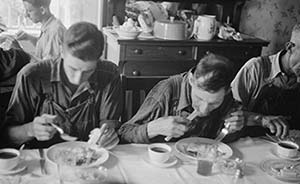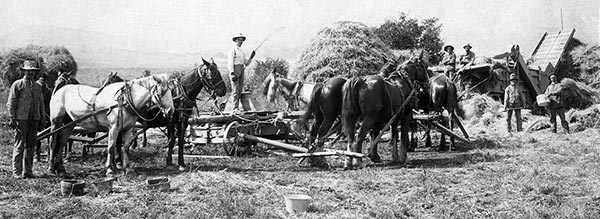Christmas Chimes

Twilight was softly gathering on a late autumn evening. The harvest moon was slowly rising above the Wasatch Range to mingle its gorgeous colors with the crimson sky, which indicated days of summer were over and an early winter was about to be ushered in. My anxious father stood gazing in the distance and listened as he sat the pail of fresh milk down on the back step where mother appeared in the open door and the fumes from a wholesome cooked supper filled the night air with an appetizing odor. It was no small task to cook for a hungry lot of threshers and the spirit of rivalry prevailing in the neighborhood. So each woman tried to outdo the neighbor woman in cooking.

Consequently the meals for the hungry and dusty lot were almost banquets and mother was obliged to call in a neighbor girl to assist with the supper which had been so carefully prepared for the expectant crew that were due an hour previous. I wonder what is keeping them so late,
mother said and a worried look shown over her face, as she feared the meal would be cold and spoiled after their big task of preparing the same.
Our threshing job was the last on the route and that old machine had been grinding since August 1th and it was now late in November. We had to wait our turn. The hands were all engaged as well as paid for as no money was in circulation. It was necessary to exchange work and the thresher took up toll. The good board they received and the common hospitality made it an easy matter to get plenty of men to work. In fact, a job on a thresher was coveted and engaged many months ahead. While we youngsters looked forward from one year to the next for the happy event and the chance to watch a threshing job generally came by invitation and especially to be permitted to push the wheat back in the bin and eat at second table after all the big men were through. To run around the track the horses had made with the sweep power after the machine had gone was also quite a privilege. So naturally my youthful heart was filled with rapture at the thought of threshers coming. My father and mother were no more anxious than I was as we waited for the approach of the coming machine.
Suddenly the silence was broken by the rumbling of wide iron tires over the frozen ground. That's them,
father said, better open the big gate,
which command I eagerly obeyed and watched the big red monster drawn inside the lot with two span horses, followed by the horse-power trap wagon and the toll wagon and the men all in a jolly mood, laughing and shouting and to me it was the crowning feature of the day. Father designated the way to set and assisted with horses and the jumbling of tumbling rods, equalizers and chains was all music to me, and I felt honored to walk up to the house with the real boss. A fresh tub of warm water was waiting outside and soon it was surrounded by the dusty and hungry threshing crew, laughing and cutting their little pranks. Around the table that was heavily laden with wholesome food they all sat. While Grace was being said I was praying in my own heart that mother wouldn't ask me to wait. And sure enough, there was a vacant place right next to the boss feeder and shareholder and I was allowed to occupy it.

I felt honored and somewhat embarrassed among all the big men, which were heroes in my young eyes, and I marveled that they could operate such a great machine and hoped that someday I might be one like them. The usual jest and jovial humor continued during the meal. Hey! You straw-monkey, someone over here wants potatoes too. The old man referred to followed the machine to stack straw for a bushel of wheat a day and, of course, felt entitled to his board and there was nothing dainty about him after bucking straw all day. Happenings of the day and plans for the morrow were talked over and finally the last man had filed out after leaving instructions for breakfast next morning at six.
I didn't sleep much that night and before the first man was on the job next morning, I was out looking over that machine. I got a liberal supply of dust on me to look and smell like a real thresher-man. At seven o'clock breakfast was all over with and horses were all hitched. The crack of the whip and shout the cogs on the power began to rumble, the face wheel on the separator began its familiar grind and soon the hum of the cylinder sent out strains of music through the keen morning air. Pitchers were dropping bundles in all shapes from top of stacks until an old experienced feeder let out a yell at a red faced husky who was fresh on the job. The clean wheat began to pour out in the half bushel measure with father, my uncle and even a third party was called to assist to carry the bags on their shoulders to the granary.
Everything was running nicely and seemed assured our grain would be threshed in good shape before winter, even though we were the last on the string. Suddenly the driver shouted, Whoa,
as he saw the green hand drop a fork headed straight for the cylinder and just missing the band cutters head. But too late. Crash in the cylinder and before the horses could be stopped a concave was broken, a casting that held the cam, with a number of cylinder teeth being bent. We are done for now (the main boss said), unless they've got extras in town. Soon the best driving horse was hitched to a buggy and a shareholder was on his way to Logan (seven miles away) for new repairs while the rest of the men straightened and replaced broken teeth. By eleven o'clock the man came driving back, but all to no avail. Not an extra this side of Racine, Wisconsin.

Well, what does that mean? It means she'll sit right there until we get one from the east. And there she sat. Stacks half threshed. The order was telegraphed in but even at that, day after day we waited and several weeks before the treasured part would arrive. Winter was approaching. The first snow had already covered the open stacks and a disabled threshing rig. It was the day before Christmas when the main boss came and announced he had a Christmas gift for us and no better gift could it be. The part for the machine had come and was soon replaced and the snow shoveled off the stacks. Soon the good old familiar hum was piercing the winter air and no better music or Christmas Chimes were ever sounded. When the last bundle was put through and the idling machine seemed to ring out clearer and louder. A Merry Christmas to all and a Happy New Year.1
Notes…
Before "Old Betsy" and steam power entered Cache Valley, all of the grain was threshed with horsepower. Ten head, or five teams often made up the motive power for the grain separator. They would stake down the "Trap Wagon" and balance the rods or wire that connected one of the wooden spokes of the sweep to the next, so as to even out the pull of the horses on the spokes of the sweep.
This was very hard work for the teams, as they had to keep up a certain speed to make it all work as planned. In Mendon, Utah as late as 1948 there were still work horses in use on some of the farms. So it was somewhat easy for L.K. Wood to round up the needed teams to put on the demonstration. Round and round they would go, stepping over the jack-shaft or tumble rod that transferred the motion from the sweep to the thresher.
In later years L.K. Wood built and used half-scale units and small ponies to makeup the horsepower. Over time all of the local work teams were phased out in favor of the new little Ford N tractors and the like.
The names of the men in this photograph are, from left to right: Matthew M. Forster, J. Parley Sorensen, Alexander W. Richards, Ephraim P. Shelton, Abraham Sorensen and Amos Hardman.
I think this photograph was taken west of Mendon, Utah up on the ground known as "The Plantation." This is the ground that is across the canal and up the road from First South in Mendon proper. I date the picture to be in the 1902 to 1910 time frame. L.K. Wood noted that a new company was formed, known as The Plantation Company, which included: William Barrett, John Ladle, James B. Hancock, Abraham Sorensen and John R. Walker.
- Christmas Chimes, L.K. Wood.